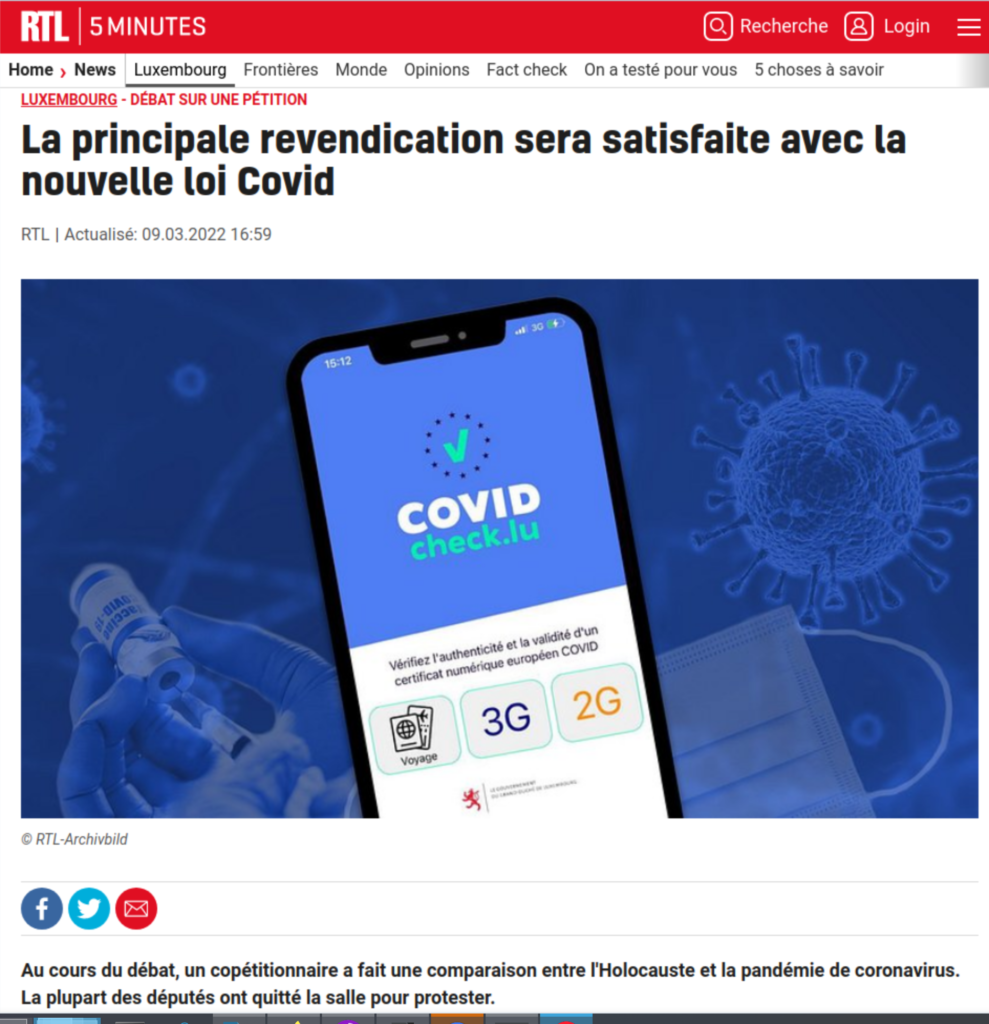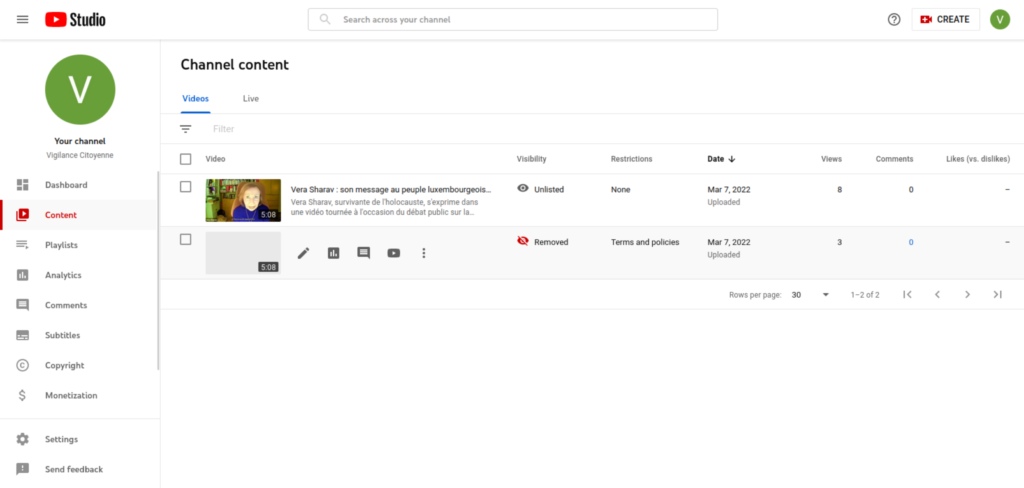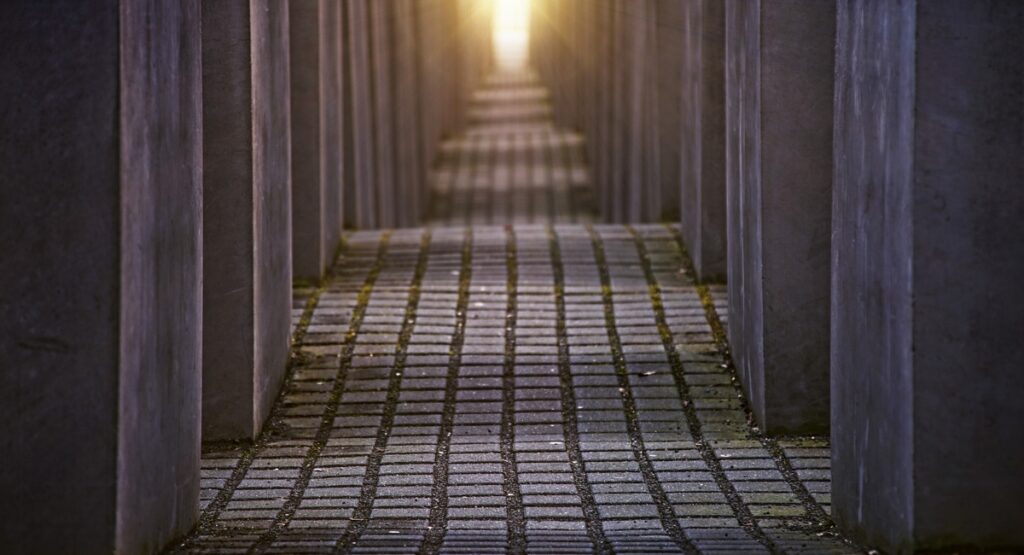References to Holocaust remembrance have been the subject of repeated public controversy in recent months. On the one hand, demonstrators did not hesitate to draw parallels with the techniques of propaganda or manipulation, censorship and ostracisation currently in force. On the other hand, most of the national elected officials have draped themselves in the virtue of the guardian of memory while accentuating discriminatory measures and singling out the unvaccinated as responsible for the situation.
The latest occurrence in the Grand Duchy was the reading of a testimony from Vera Sharav, a Holocaust survivor (see our article “Vera Sharav: her message to the people of Luxembourg“) which led to an incident during the public debate on petition 2044 opposing the CovidCheck.
An amputated public discussion
When the first lines of this testimonyn were read, the deputies present left the room in protest, which the official video only makes it possible to understand in the last shots of the sequence.
And to talk about propaganda, let’s quote RTL which reported the event by claiming that a co-petitioner “made a comparison between the Holocaust and the coronavirus pandemic”, which is misleading to say the least.
The co-petitioner whose reading was thus interrupted was a young 17-year-old apprentice, also triple-vaccinated and suffering from heart problems since his post-booster shot Covid. By joining the ranks of the co-petitioners, Michel was keen to embody the youth, exposing to our consciences the poignant message of a person whose experience and stature should have commanded a minimum of respect from our elected officials.
And all the more so since an email had been sent to them the day before with a link to this video.

Let us assert, since Vigilance Citoyenne was involved on the side of the petitioners, that to bring to light the words of a survivor of the Shoah, specially collected for the occasion and dealing – on the initiative of its author – with the beginnings of the Holocaust under Nazism, is not (and such was not the intention) to accuse “the opposite row” of Nazism. An opposite row of which everyone is also aware that it is present in all its diversity since it emanates from parliamentary pluralism.
Surely, this reading could have been better contextualized, which a certain haste due to the format of the session did not allow. Surely, too, politicians could spare us the postures of lecturers on such a serious matter around which we should be able to meet and exchange. There should be nothing “unacceptable”, to use the adjective of Mr. Mars Di Bartolomeo, in the intention to learn from the memory of this darkest of episodes.
And all the less so since Mrs. Sharav is not the only witness, direct or indirect, to thus draw parallels between current events and the years which preceded the Holocaust, under Nazism.
Minimising what the Holocaust was?
Radio München, for example, in its program “Wehret den Anfängen – was Juden heute denken” (“Beware of denunciation, what the Jews think today”) has descendants of Jewish victims of the Shoah speak on this subject.
For example, when asked if drawing parallels with current events is minimizing what the Holocaust was, an Austrian descendant of a Holocaust survivor testified that “for people whose loved ones survived the Shoah, to denigrate or even deny the Shoah is an inconceivable idea. For it is precisely for the descendants of Holocaust survivors that it is self-evident to want to prevent the dictatorships that made the Holocaust possible.
[…]
People who had to live through the Shoah are therefore not ready to be denied their right to look at present times and draw the comparison they consider urgent.
To the same question, another witness replied: “No, this is not a minimisation of the Shoah, because we are not comparing apples with pears, we are comparing the beginnings. We are not at the point where the Shoah ended. We are at the beginnings that led to the Shoah. If we cannot make this comparison, then we are in a system that can lead to a new Shoah.”
“In a democracy, everyone should have the same rights, regardless of race, religion, ethnicity or anything else. In this sense, everyone must make these comparisons. But de facto, it is true that the descendants of the victims feel a bit more comfortable in doing so.
A witness speaking on Radio München
An undeniable memory
Thus, comparisons of the current era with the beginnings of the Holocaust are far from being unanimously considered taboo by the first concerned themselves. Why should it be for others, if there is precisely a shared will not to reproduce the same mistakes? This touches not only on a question of (alleged) moral principle, but potentially on manipulation tactics that these witnesses identify perfectly… and therefore on the key question: is this will really shared?
For if there is one thing that any person of good faith should have no difficulty to admit here, it is that each voice that expresses itself does so according to its personal sensitivity and in relation to facts that it is impossible to deny, except by falling into a form of negationism, precisely.

While the testimonies all insist on the gradual implementation of the measures that preceded the Holocaust, and the habituation of consciences that accompanied it, the fact that no one today seems to care, for example, about the level of censorship now rampant on social media and in mainstream media, illustrated by the bias with which the media treats anyone who challenges the official narrative, tends to indicate that we are already at an advanced stage.
However, warning signals had reached us, before the Covid-19 crisis and the so-called “sanitary” restrictions.
To quote a recent one, let’s remember that of Marian Turski, delivered on January 27, 2020, and which resonates with our current situation: “But be careful, be careful, we are already beginning to become accustomed to thinking, that you can exclude someone, stigmatize someone, alienate someone. And slowly, step by step, day by day, that’s how people gradually become familiar with these things. Both the victims and the perpetrators and the witnesses, those we call bystanders, begin to become accustomed to the thoughts and ideas, that this minority that produced Einstein, Nelly Sachs, Heinrich Heine and the Mendelssohns is different, that they can be expelled from society, that they are foreign people, that they are people who spread germs, diseases and epidemics. That is terrible, and dangerous. That is the beginning of what can rapidly develop.”
Could Mr Turski, an Auschwitz survivor, also have had in mind the labels of “anti-vaxx” and “conspiracy theorist” that were already flying around in early 2020? We don’t know. The fact remains that it is indeed these labels, not to mention the supreme wrong of being among the unvaccinated, that today are supposed to justify censorship and exclusion… or even the denial that these exist, as illustrated by the comments of Mr. Sven Clément during the public discussion on the above-mentioned petition.
“It started with exclusion and today you can no longer pass the driving license if you are not vaccinated. Today you cannot go to university if you are not vaccinated. Yes…my mother couldn’t go to school either because she didn’t belong to the social class that was allowed.”
A witness descendant of a victim of the Holocaust, on Radio München
Never again is now
Since the beginning of the Covid crisis, other testimonies from Holocaust survivors have emerged on social networks, such as that of Nick Hope, who in a video declares “when I see the news in Austria, I see the spirit of Hitler”. This former Dachau prisoner was speaking at the time of the vote of vaccine mandates in Austria, and of ruthless penalties on those who do not comply.
More structured, We for Humanity, an Amsterdam-based organisation made up of Holocaust survivors and their descendants, has been working since 2021 and aims to share and have the whole world benefit from what the Jewish people have learnt from the tragic experience they went through. Their latest communication is unequivocal and targets the mainstream media, which they accuse no more, no less, of “[abusing] Holocaust to enable new Holocaust”. They “expressly warn that another holocaust is unfolding, only bigger and more sophisticated. The brutality with which they [les médias] fight, deny, hurt and humiliate the opposition, both verbally and physically, serves to suppress the truth”.
The tone is set. It is set by Jews who were direct victims of the horror, or of what it left behind in families, in hearts and in flesh.
For our part, we believe that it is an insult to these men and women, and to the memory they embody, to accuse those who carry these messages of minimising the horror that was the Holocaust. Moreover, we do not find any quality, any qualification that would allow us to judge otherwise, in the figures who today embody authority and whose personal fate may depend precisely on the minimisation of this memory and on the current liberticidal and authoritarian measures.
It therefore seems important to us to stand firm on the memory of the Holocaust and try to establish a constructive dialogue on these subjects. And not to hesitate to denounce the political manipulations which have no other effect than to put away the appeals to this memory to the rank of theory, even conspiracy theory.
Never again is now. Thank you Vera Sharav.
VC
